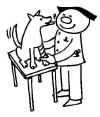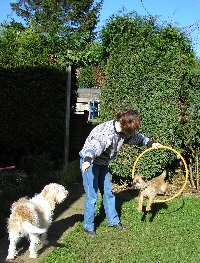Getting the very best treatment for your dog...
 Many
veterinarians are not familiar with the special needs of agility dogs. For most of your
requirements, as long as you communicate clearly, your local vet should be perfectly
capable of dealing with the needs of your dog or dogs. It is, therefore, very important to
point out to your vet that you do agility and that your dog is a canine athlete and needs
special handling. Clinical vet nurse Frances Gaudiano gives you some pointers on what to say
when you get to the surgery. Many
veterinarians are not familiar with the special needs of agility dogs. For most of your
requirements, as long as you communicate clearly, your local vet should be perfectly
capable of dealing with the needs of your dog or dogs. It is, therefore, very important to
point out to your vet that you do agility and that your dog is a canine athlete and needs
special handling. Clinical vet nurse Frances Gaudiano gives you some pointers on what to say
when you get to the surgery.
Starting with your yearly vaccination check up, be sure to
request a double appointment when you book in but do expect to pay more for it. If you want all
body systems fully investigated, the extra time with your vet is necessary. It is much better
to nip something in the bud than wait until it is destroying your dogís performance and quality
of life.
Make clear to your vet that any irregularity should be
explained to you in full. Tell your vet that your dog goes to shows nearly every weekend of the
summer. You need effective, fast-acting, adulticide flea treatment and frequent worming. You
may also choose to request a kennel cough vaccine. Make it clear that it is your goal to keep
your dog in peak performance condition.
 Heart
condition Heart
condition
Since your dog has to run, its cardiovascular health is of utmost importance. There should
be a careful chest auscultation, of both sides of the chest. Pulse strength as well as speed
should be recorded. A femoral pulse (inside of the hind leg) should be taken and compared to
the heart rate. If there is any question about rhythm, an ECG should be performed. The vet
should notify you of any murmurs, however minor, and you should feel free to ask questions
about how cardiovascular abnormalities may affect performances. There are many supportive
medications available for cardiac disease and you should express that you would like to start
drug therapy sooner, rather than later, if it is deemed necessary. Discuss with your vet any
alternatives that can be made to your dogís exercise and training regime that will keep him
healthy while still allowing him to perform in agility.
 Mobility Mobility
Arthritis and hip dysplasia are major concerns in the agility world. Most dogs and their
handlers would like to continue to compete but need to do so without experiencing pain. There
are drugs now that can be given long-term without excessive side effects. There are also
nutraceuticals and special joint mobility diets (with green-lipped mussel) available to ease
these conditions.
Do ask for information on alternative treatment. Many
owners use hydrotherapy to increase joint mobility without causing stress to the joint. Ask for
a referral to a hydrotherapy centre if you think it will assist your dog. Most of these
treatments are covered by insurance.
 Strains
and sprains Strains
and sprains
Tendon and ligament strains are common agility injuries. The standard treatment for minor
injuries can often be an injection of non-steroidal anti-inflammatory and the recommendation of
rest. Do tell your vet that your dog does not enjoy resting and that you would prefer a more
pro-active rehabilitation plan. Again, hydrotherapy may be the answer.
Alternatively, physiotherapy, acupuncture or chiropractics
may be helpful. If your practice does not have active treatment modalities, ask to be referred
to a specialist that can give you a set of exercises and treatments to speed and enhance
recovery. Sometimes simple things like hot packs or cold packs can make a tremendous amount of
difference in healing time.
Simple massage techniques can be learned by owners and
practised daily on the injured pet. You just need to be pointed in the right direction - animal
physiotherapists do exist, you just have to ask for them.
 Broken
bones Broken
bones
If you do suffer a major injury, such as a fracture, consider seeing a specialist
orthopaedist for fracture reduction. The kit required for advanced fracture reduction
techniques is so expensive that many practices do not stock it. Referral to a specialist is
frequently suggested in these cases. Most referral centres will also be able to advise you on
physiotherapy for rehabilitation.
 Under
the weather Under
the weather
Sometimes, you may sense that your dog is not himself although he seems fine as he bounds
into the vet. Explain that you can see that your dog is not working efficiently at training and
request an investigation. (Otherwise, you may just get the non-steroidals again). Your vet is
not a mind reader so give some suggestions about what you think the problem is. You know your
dog and you know where its weak points are. If you think the problem is skeletal, then an x-ray
or scan would be in order. If your dog just seems generally off colour, then maybe blood tests
are in order. General haematology and biochemistry blood tests are a good starting point to
investigate an underlying condition.
If your dog has been diagnosed with a systemic disease and
is on medication, do ask the vet to keep your dogís working needs in mind while creating a dose
rate for your dog. For example, if your dog is epileptic, you may not want it on the highest
dose possible of tranquillisers. While you need to control the symptoms, the dose should be
individually tailored to your active dog.
 Eye
sight Eye
sight
Because there are so many collies competing in this sport, collie eye
diseases are a point of concern. Keen eyesight is required in order for the dog to move safely
at speed around an agility course. Any collie that begins to slow down should be examined for
hereditary eye disease. Certainly any collie used for breeding should be screened for eye
disease prior to breeding. This may involve referral to a specialist in ophthalmology.
 Dietary
advice Dietary
advice
Good nutrition plays a part in any athleteís career. You should be able to look to your
veterinary practice for advice on performance diets, or, conversely, reduced calorie diets to
keep their dog in fit shape for competition. Obviously, an obese dog will be more prone to
injury and will have reduced cardiovascular fitness. It will also probably be a bit slow
getting around the course. Most nurses have done courses in nutrition and should be able to
advise you about the correct diet for your dog. Veterinary diets are that bit more expensive
but they are good quality food.
If you are having a major behaviour problem with your dog,
a good vet will do a thorough physical work-up to detect any physical problems that may be
causing the behaviour changes. Pain, liver or brain abnormalities can all cause significant
changes in behaviour. If on finding that your dog is physically healthy, you are still
struggling with a behaviour problem, there are chemical aides to deal with many problems.
However, you should consult with a behaviourist if you choose to use drug therapy. Drug therapy
should be done in conjunction with a behaviour modification programme. This goes for something
as simple as sound phobias! A veterinarian specializing in behaviour medicine can prescribe
both the drugs and behaviour modification programme. Again, ask for a referral. Behaviour
consultations with a vet are covered by insurance.
Just tell them what you need
It may sound like I am advising you to just go to specialist and ignore your general
practice vet. Well, for anything major, I would go to a specialist. Itís just common sense that
someone who has done a certain bone operation 300 times is going to better at it than someone
who has only done it 10 times.
However, for most of your needs, as long as you communicate
clearly with your vet, you should be perfectly well satisfied with your local vet. Just tell
them what you need. Remember, veterinary medicine is a business and your practice wants you to
be a satisfied customer. And if you are not happy, you are allowed to ask for a second opinion.
Your vet is obliged by the Royal College of Veterinary Surgeons professional conduct code to
forward all your case notes to a second vet for a further opinion. Remember, you are paying for
veterinary care and you should be satisfied with the service. I do think that 99% of practices
are probably thrilled to have agility dogs as their patients and will work with you to
establish excellent care plans. Vet practices like owners who are concerned, compliant and do
their best to keep their dogs fit and healthy.
 About
the author... About
the author...
Frances Gaudiano VN, DipDerm is a
clinical trials nurse at the Royal Veterinary College in Hertfordshire. She has written a book
on dermatology for veterinary nurses and the nose of one of her dogs is on the cover of the
book.
Frances competes with a Border Terrier
who does not have skin problems but could do with a personality transplant. (But she loves him
anyway!)
|